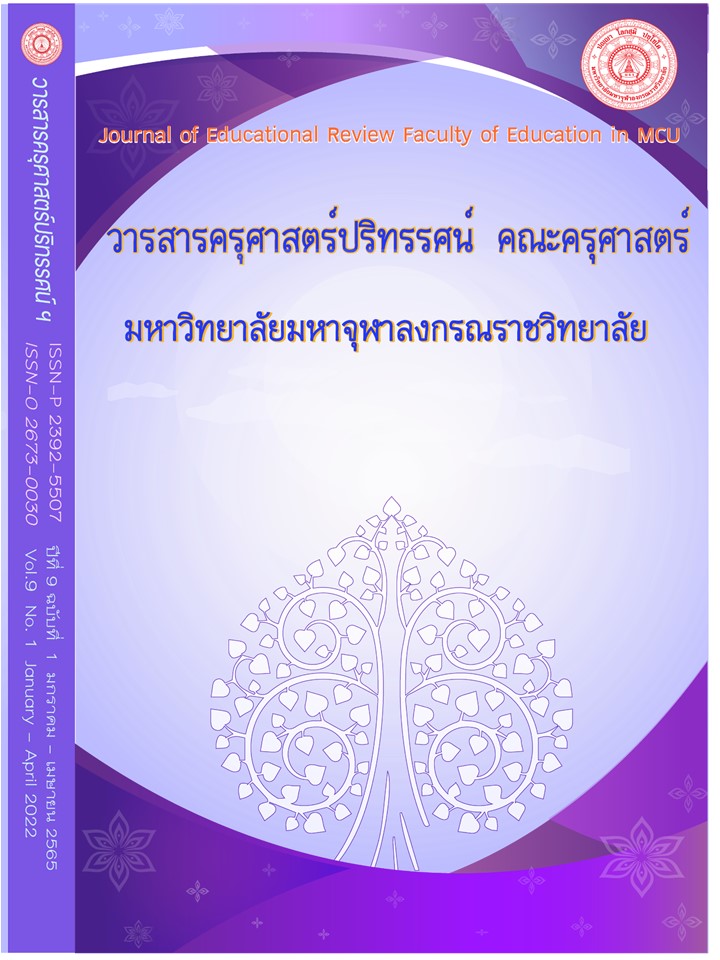BUDDHIST LEADERSHIP FOR SCHOOL ADMINISTRATORS IN THE ERA OF DISRUPTION
Main Article Content
Abstract
This academic paper presents Buddhist leadership for school administrators by applying the principles of the Lord Buddha's teachings to fit the disruptive world which educational institutions will have a good policy plan no matter how good is it. However, if educational personnel in educational institutions fail to comply, they cannot achieve the objectives according to the policy plan. Leadership of the educational institution administrators is important and necessary in planning that policy. Educational institute administrators are Buddhist leadership, which is an integrated moral and ethical principle for educational institution administrators to develop modern progressive thinking and is ready to change itself all the time to keep up with the era of globalization and digital disruption. It includes making consistent with the Buddhist way of life and culture of Thai people that have been refined from the teachings of Buddhism that are unique that the world knows, understands and accepts that it is always up to date, and the tenses do not change.
Article Details

This work is licensed under a Creative Commons Attribution-NonCommercial-NoDerivatives 4.0 International License.
ทัศนะและความคิดเห็นที่ปรากฏในบทความในวารสารฉบับนี้ถือเป็นความรับผิดชอบของผู้เขียนบทความนั้นเพียงผู้เดียว และไม่ถือเป็นทัศนะและความรับผิดชอบของกองบรรณาธิการ
กองบรรณาธิการขอสงวนสิทธิ์ในการคัดเลือกบทความลงตีพิมพ์และจะแจ้งให้เจ้าของบทความทราบหลังจากผู้ประเมินบทความตรวจอ่านบทความแล้ว
ต้นฉบับที่ได้รับการตีพิมพ์ในวารสารครุศาสตร์ปริทรรศน์ คณะครุศาสตร์ มหาวิทยาลัยมหาจุฬาลงกรณราชวิทยาลัย ถือเป็นกรรมสิทธิ์ของคณะครุศาสตร์ มหาวิทยาลัยมหาจุฬาลงกรณราชวิทยาลัย ห้ามนำข้อความทั้งหมดหรือบางส่วนไปพิมพ์ซ้ำ เว้นเสียแต่ว่าจะได้รับอนุญาตจากมหาวิทยาลัยฯ เป็นลายลักษณ์อักษร
References
พระเทพปริยัติเมธี (สฤษฏิ์ สิริธโร). (2553). ภาวะผู้นำเชิงพุทธกับการจัดการความขัดแย้งในสังคมไทย. รายงานวิจัย. มหาวิทยาลัยมหาจุฬลงกรณราชวิทยาลัย.
พระเทพโสภณ (ประยูร ธมฺมจิตฺโต). (2547). บ ว ร กับการพัฒนาโรงเรียนวิถีพุทธและอนาคตของสังคมไทย. กรุงเทพมหานคร: สำนักงานคณะกรรมการการศึกษาชั้นพื้นฐาน.
พระธรรมกิตติวงศ์ (ทองดี สุรเตโช). (2548). พจนานุกรมเพื่อการศึกษาพุทธศาสน์ ชุด คำวัด. กรุงเทพมหานคร: ธรรมสภา.
พระพรหมคุณาภรณ์ (ป. อ. ปยุตฺโต). (2559). พจนานุกรมพุทธศาสน์ ฉบับประมวลธรรม. พิมพ์ครั้งที่ 10. กรุงเทพมหานคร: มหาจุฬาลงกรณราชวิทยาลัย.
พระอัครเดช ญาณเตโช. (2557). พุทธวิธีการบริหาร. แหล่งที่มา https://www.stou.ac.th/study/sumrit/5-58(500)/page1-5-58(500).html สืบค้นเมื่อ 1 ก.พ. 2565.
ภัคภพ์ไผทท์ ภคสกุลวงศ์ และอานนท์ เมธีวรฉัตร. (2564). การบริหารงานบุคคลตามหลักพุทธธรรมาภิบาลในยุคดิจิทัล. วารสารมหาจุฬาวิชาการ. 8(2). 357-369.
วิจักษณ์ พานิช. (2544). เลิกถือพุทธสู้วิถีพุทธ. มติชนสุดสัปดาห์. 25(2). 9.
สำนักเลขาธิการคณะรัฐมนตรี. (2562). คำแถลงนโยบายของคณะรัฐมนตรี. กรุงเทพมหานคร: สำนักพิมพ์คณะรัฐมนตรีและราชกิจจานุเบกษา.
สุชัชวีร์ สุวรรณสวัสดิ์. (2563). รับมือโลกยุค “ดิสรัปชั่น”หมดยุคค่อยเป็นค่อยไปต้องรีบปรับให้ทันโลก. แหล่งที่มา https://www.brandage.com/article/16571/Digita-Disruption สืบค้นเมื่อ 30 ม.ค. 2565.
สุภัทรศักดิ์ คำสามารถ ศิรินทิพย์ กุลจิตรตรี และโกวิท จันทะปาละ. (2563). แนวทางการบริหารการศึกษาในยุคดิจิทัลดิสรัปชั่น. Journal of Modern Learning Development. 5(3). 245-259.
สุวิน สุขสมกิจ. (2549). พุทธปรัชญากับการสร้างเสริมภาวะผู้นำ : ศึกษาเฉพาะกรณีผู้นำระดับกำนันผู้ใหญ่บ้านในจังหวัดกาญจนบุรี. วิทยานิพนธ์รัฐศาสตรมหาบัณฑิต. จุฬาลงกรณ์มหาวิทยาลัย.


